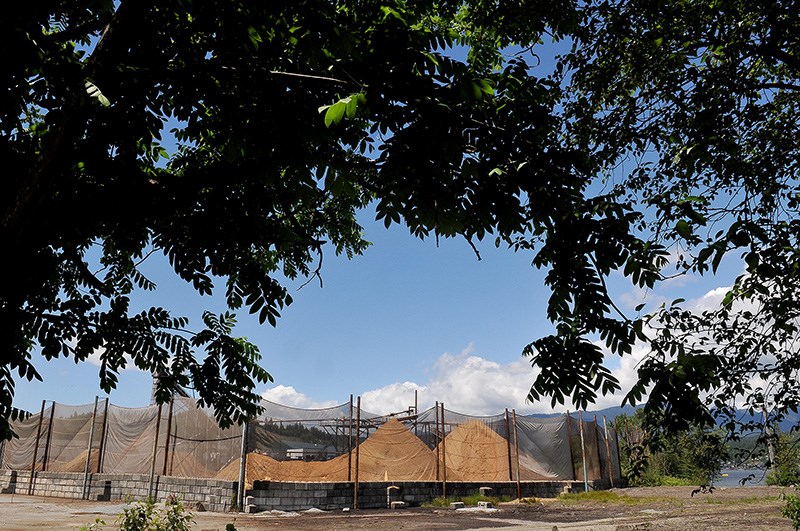The jobs of 75 employees at the Flavelle Cedar mill in Port Moody could be at risk because of an unexpected property tax hit.
Bruce Gibson, Flavelle’s vice-president of real estate, said an 11% increase in the portion of Port Moody’s total property tax revenues that is borne by its three major industrial properties — Flavelle, Petro-Canada/Suncor and Reichhold Chemicals — will cost the company “hundreds of thousands of dollars.” (The city’s other major industrial property, Pacific Coast Terminals, has its tax rate capped by the province.)
Gibson added that could make it difficult for the company to justify preserving jobs at the mill while it works to relocate those employees to other sites in anticipation of redeveloping its 34-acre (12.7 hectare) industrial waterfront property into a high-density, mixed-use development that could be home to up to 7,000 people.
“When you have a major cost impact like this, it’s very problematic,” Gibson said. “It doesn’t help anybody if the mill is shut.”
Gibson said Flavelle wasn’t aware of the potential property tax hit until the city’s 2019 financial plan was presented at a special meeting of council Tuesday for its first three readings.
“We were quite taken aback,” Gibson said. “This appears to have slipped in at the last minute.”
In the plan, the percentage of Port Moody’s property tax revenue to be paid this year by owners of Class 4 (Major Industry — Other) is 15.56%, up from 13.9% last year. Residential property owners are responsible for 63.95% of the city’s property tax revenue (down from 65.45% last year) and businesses account for 14.04% (down from 14.09%).
Paul Rockwood, Port Moody’s general manager of finance and technology, told council the property tax burden on heavy industry had to be increased to allow for any potential shortfall because of an appeal filed by Petro-Canada to BC Assessment disputing the assessed value of its property. He said the city was only recently informed by BC Assessment that the company had filed an appeal by its April 30 deadline.
“That’s when the alarm bells went off,” acting mayor Meghan Lahti told The Tri-City News Wednesday, adding most of the additional tax hit to Port Moody’s major industrial properties is due to higher property assessments.
According to BC Assessment, the assessed value for Petro-Canada’s 359.8-acre property at 1155 Glenayre Dr. is $195,759,100. Last year, it was assessed at $104,733,500 — that’s an almost 87% increase.
Lahti said even the provisions of Bill 42, which was enacted by the B.C. government last December to protect major industrial properties from huge tax increases because of higher assessments brought on by speculation, wasn’t enough to shelter the sites in Port Moody.
“This already took that into account," she said of the budget.
Rockwood said “there’s appeals every year” to assessments but they’re usually small and any changes to those assessments that affect the city’s tax roll are covered by a transfer of funds to its assessment appeals reserve.
“This was a risk-mitigation strategy to ensure the city has sufficient funds to deal with an appeal and protect the community against unforeseen financial risk,” he said, adding the reserve isn’t used if an appeal is unsuccessful.
Coun. Zoe Royer expressed concern about the “hardship” the added tax burden could inflict upon Flavelle and the other heavy industry employers.
“We’re concerned about the fragility of our industrial land,” she said. “I can’t imagine a community without employment.”
And while Royer’s motion to amend Port Moody’s tax bylaw to include a provision that would see any additional money collected from the city’s industrial properties for the reserve be reimbursed should Petro-Canada not succeed with its appeal was rejected by council, it did pass a motion for council’s finance committee to reconsider the issue once BC Assessment has made its decision.
“I think it’s the right thing to do from a moral perspective,” Lahti said, adding the issue may be the catalyst that leads to a comprehensive reassessment of how taxes are spread across all of Port Moody’s property classes.
PROPERTY TAX RATES
As expected, council gave three readings to its financial and tax rate bylaws that will see residential property taxes go up by 5.4%, or $120 for an average household assessed at just over $1 million. The total blended property charge, which includes property tax and utility levies, will be about $3,590 per average household, a 4.98% increase from last year. Those bylaws will be considered again by council for adoption at its regular meeting next week. Under the province’s community charter, the city’s tax rate bylaws must be adopted by May 15.
5/10 — corrected size of Flavelle property.



